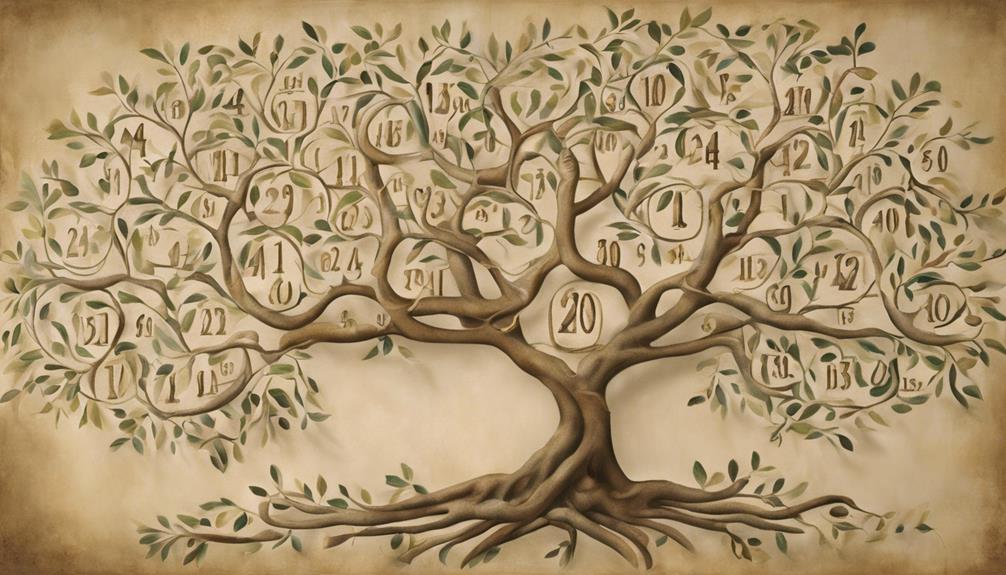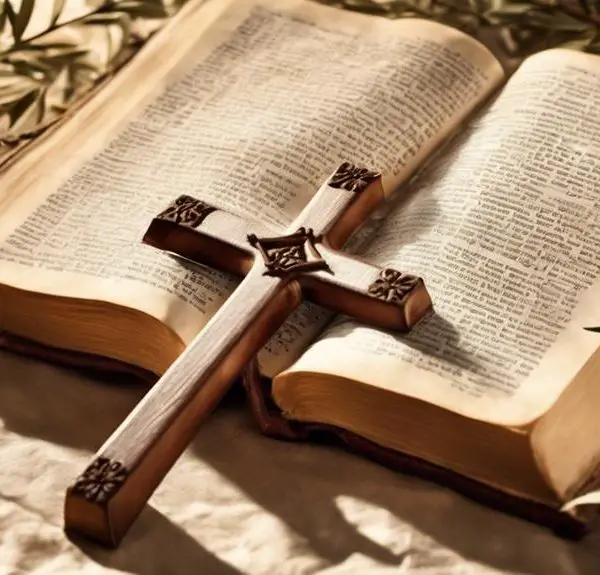Learn how the number 14 symbolizes liberation and fulfillment in biblical numerology, opening a portal to ancient prophecies and divine designs.

14 in the Bible Numerology
In the tapestry of biblical numerology, the number 14 emerges as a vibrant thread, intricately woven through generations and prophecies.
You'll find it not just a marker of time in genealogies or the cornerstone of Passover celebrations, but as a symbol carrying deeper revelations about liberation and fulfillment.
As you explore its presence and significance, you'll uncover patterns that reflect a divine design, inviting you to consider the layered meanings behind this seemingly simple digit.
This journey through scripture might just alter your understanding of biblical narratives and the prophetic messages encoded within.
Key Takeaways
- The number 14 symbolizes divine purpose, reflecting in Jesus's genealogy and the structured hierarchy within heavenly hosts.
- It is linked to Passover, representing liberation from bondage and the theme of salvation.
- Symbolizing completeness and divine order, 14 invites exploration of deeper biblical meanings and God's perfect timing.
- Demonstrates divine intervention and prophetic precision in biblical genealogies and the fulfillment of prophecies.
Significance in Genealogies

In biblical genealogies, the number 14 plays a pivotal role, symbolizing generations and divine purpose through carefully structured lineages. You'll notice that this numerical pattern isn't arbitrary. Instead, it's a deliberate design, woven into the text to underscore the meticulous construction of the Bible's narrative framework. Through family lineage analysis, these numerical repetitions become apparent, particularly in the genealogy of Jesus Christ as presented in the Gospel of Matthew.
Matthew meticulously organizes Jesus's ancestry into three sets of 14 generations, from Abraham to David, from David to the Babylonian exile, and from the exile to Christ. This structure isn't just a mnemonic device; it's a theological statement. The repetition of 14 generations serves to highlight divine intervention in human history, emphasizing the fulfillment of prophecy and the establishment of a divine order.
Passover and Liberation

Exploring the symbology of the number 14 reveals its profound connection to Passover and the theme of liberation, underscoring a period of deliverance that is critical to understanding biblical narratives. This numerical representation isn't arbitrary; it echoes through the generations, marking significant moments of transition and renewal. The Passover, celebrated on the 14th day of the first Hebrew month, isn't just a historical recount; it's a vibrant reminder of the journey from bondage to freedom, deeply embedded in the fabric of biblical teachings.
Aspect |
Biblical Times |
Modern Observances |
|---|---|---|
Feast Traditions |
Lamb sacrifice |
Seder meal |
Symbolism |
Blood on doorposts |
Afikoman search |
Purpose |
Divine protection |
Remembrance & Education |
Your understanding of Passover isn't complete without recognizing its intricate ties to feast traditions, both ancient and modern. These traditions have evolved, yet their core purpose remains: to commemorate liberation and instill the values of faith and perseverance. Modern observances, while reflective of the original rites, adapt to contemporary contexts, ensuring the message of Passover remains relevant and accessible. As you delve deeper into the significance of the number 14 in biblical numerology, you uncover layers of meaning that enrich your appreciation for these timeless narratives of liberation.
Biblical Prophecies Fulfilled

Delving into biblical numerology, you'll find that the number 14 holds key insights into prophecies fulfilled, revealing a layered complexity within the scripture's predictive texts. This number isn't just a figure; it's a marker of divine orchestration in the unfolding of significant events that were foretold, particularly Messiah predictions and temple reconstructions.
To grasp the depth, consider these points:
- Messiah Predictions: The prophecies concerning the Messiah are intricately linked with numerical patterns, notably the genealogy of Jesus Christ in the Gospel of Matthew, which is structured around the number 14. This isn't coincidental but a deliberate design to underscore the fulfillment of prophetic anticipation.
- Temple Reconstructions: The destruction and subsequent reconstructions of the temple are pivotal events that were prophesied and fulfilled within specific timelines. These events, tied to numerical significances, underscore a pattern of judgment, restoration, and divine promise.
- Prophetic Precision: The precise fulfillment of these prophecies, including specific time frames and events, exemplifies the accuracy and reliability of biblical prophecy, reinforcing the belief that the scriptures are divinely inspired and hold deeper truths within their numerical frameworks.
Analyzing these instances reveals the meticulous nature of biblical prophecies, where numbers serve not only as symbols but as confirmations of divine intervention and foresight.
Symbolic Meanings Unveiled

Having examined the prophetic importance of the number 14, let's now uncover its symbolic meanings within the biblical narrative, offering a deeper understanding of its spiritual significance. This number intricately ties into the Creation days, symbolizing a completeness that goes beyond the literal week. It hints at a deeper, spiritual completion, reflecting God's comprehensive plan for the universe and humanity. The seven days of Creation, doubled to 14, suggest a reinforcement of divine perfection and order, inviting you to consider the world's structured, intentional design.
Furthermore, the concept of Angelic ranks finds resonance with the number 14. Biblical scholars argue that this number indirectly points to the structured hierarchy within the heavenly hosts. Just as there are multiple levels of angels, from archangels to seraphim, the number 14 symbolizes the organization and authority within the spiritual realm. This numerical symbolism encourages you to contemplate the meticulous order that governs not only the physical world but also the spiritual one.
In dissecting the symbolic implications of the number 14, you're invited into a realm where numbers serve as keys, unlocking the deeper layers of biblical teachings and divine mysteries.
Patterns and Reflections

Throughout the biblical narrative, the number 14 emerges in patterns and reflections that mirror divine orchestration and human history, beckoning you to discern the intricacies of God's master plan. This number's significance is deeply woven into the fabric of scripture, illustrating a divine structure that transcends mere coincidence.
- Creation Days: The biblical account of creation unfolds over seven days, hinting at the importance of numbers in divine order. When you delve deeper, the concept of 14 as a multiple of seven underscores completeness and God's perfect timing in both creation and judgment phases.
- Generational Patterns: In the genealogy of Jesus, you'll find that there are 14 generations from Abraham to David, 14 from David to the Babylonian exile, and 14 from the exile to Christ. This tripartite division not only emphasizes the fulfillment of prophecy but also reflects a divine arrangement within human history.
- Angelic Numbers: Angelic numbers within the Bible often carry profound spiritual insights. The number 14 is associated with deliverance and salvation, symbolizing God's guidance and protection over his people.
These patterns and reflections within Bible numerology invite you to explore the depth of God's messages, revealing a complex interplay between divine will and the unfolding of human events.
Frequently Asked Questions
How Does the Concept of Numerology in the Bible Differ From Other Ancient Cultures' Approaches to Numerology?
When you're comparing numerology across ancient cultures, you'll find the Bible's approach stands out due to its unique interpretations and symbolic meanings.
Unlike other traditions, the Bible often assigns deeper, prophetic significance to numbers, diverging from more general uses seen elsewhere.
This difference in cultural interpretation underscores a distinct perspective on ancient symbols, emphasizing a more spiritual or divine connection rather than mere calendrical or practical applications found in other societies.
Can Numerology in the Bible Provide Insights Into Personal Life Decisions or Future Predictions, Similar to Modern Numerology Practices?
You might wonder if numerology can offer personal guidance or help in forecasting your future, similar to modern practices. While it's intriguing, it's essential to approach with a critical mind.
Numerology's insights into life decisions or future predictions aren't scientifically proven. Its effectiveness heavily relies on interpretation and belief.
For meaningful guidance, it's advisable to consider a blend of introspection, expert advice, and perhaps a pinch of numerological insight for perspective.
Are There Any Numbers in the Bible That Have Evolved in Their Significance Due to Changes in Language, Culture, or Interpretation Over Time?
Absolutely, numbers have evolved in significance due to translation challenges and cultural shifts.
For instance, the number '7' often symbolizes completeness, but its interpretation can vary widely across cultures and historical periods.
Moreover, as languages evolve, the original meanings embedded in these numbers may shift, leading to nuanced or even entirely new interpretations.
This evolution highlights the dynamic nature of symbolism and its susceptibility to changes in human understanding and societal values.
How Do Skeptics and Critics of Biblical Numerology Justify Their Viewpoints, and What Are the Main Arguments Against Finding Meaning in Biblical Numbers?
You might wonder how skeptics justify their viewpoints against finding meaning in numbers. They argue that patterns seen are often mathematical coincidences, not intentional design. Through scientific scrutiny, they highlight that humans are pattern-seeking creatures, and what's perceived as significant can actually be random.
Critics stress that without solid, empirical evidence, attributing deep meanings to numbers falls short of rigorous analysis, leaning more towards speculative interpretation than factual understanding.
In What Ways Have Contemporary Religious Communities Incorporated or Rejected Biblical Numerology in Their Teachings and Practices?
You'll notice that contemporary religious communities have a mixed approach to incorporating numerical rituals in their teachings. Some embrace these practices, believing they add depth and structure to their faith, while others reject them, fearing they lead to unnecessary community division.
Analyzing these trends, it's clear that the debate isn't just about numbers; it's about how these numbers shape or reflect the core values and beliefs of the community.
Conclusion
In your exploration of the number 14 in biblical numerology, you've uncovered its deep roots in genealogies, its association with Passover and liberation, and its fulfillment in biblical prophecies.
Delving into its symbolic meanings, you've recognized the intricate patterns and reflections that 14 presents, revealing a rich tapestry of interconnectedness and divine intention.
This analysis not only enhances your understanding of biblical texts but also illustrates the meticulous detail and profound symbolism encoded within the scripture's numerical landscape.



Sign up